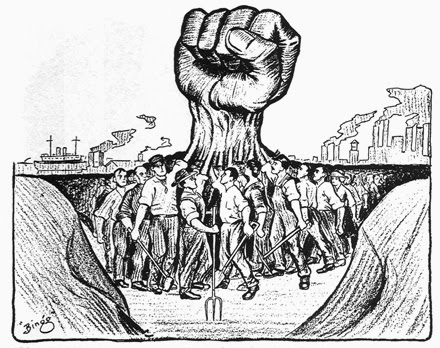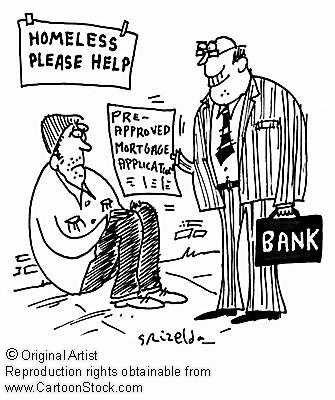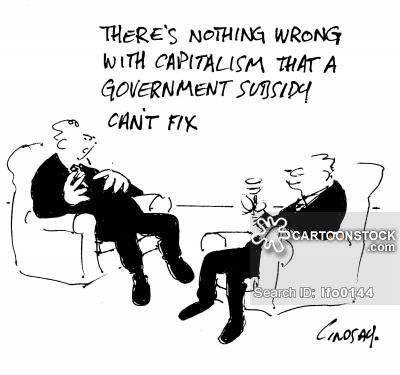Revolution Of The Working Class - Slipping Through The Cracks Of Capitalism
The way class works in our society can best be understood if you think about how a business works. In most businesses the people who do the work five days a week doing what the employer hired them to do with the equipment and materials the employer provides.
At the end of the day they go home and the employer keeps the fruits of their labor which the employer then sells. The employer buys their time wholesale and he sells the output than it cost him to buy the tools, equipment, raw material and hire those workers.
Class is this difference between those who do the work and those who gather the profit.
The way our society divides up the output leaves those who get the profits in the authoritative position of deciding what to do with them. And we all live with the results of what a really tiny minority in our society decide to do with the profits everybody produces.

The profits in our society are huge and when you think about 500 to a thousand large corporations in the United States do the overwhelming bulk of the business you realize that into the boards of directors of these companies flows a huge part of what you might call the discretionary income in this society.
If these profit earning companies decide they can make more profit by adopting a technology which has the unfortunate result of polluting the air or the water, corporations will typically do that because the profit is more important to them than the social consequences that basically they don't have to live with and they don't have to pay for. And so you will get decisions about how to use the profit which is a social disaster in terms of the health mental and physical well being of other people.
Having a small group driven by profit gathering into their hands the discretionary fund shapes everything about the way we live.
Class is one of the most repressed discourses in this country. Many Americans insist that we're all in the middle-class, that if there are a handful of desperately poor people at one end and maybe a handful of desperately rich ones at the other, they're really a tiny footnote to a vast middle.
This is a way of pretending the class differences, wealth, power, corporate structure, somehow aren't there or don't matter. They pretend that the issue isn't there or it doesn't matter or we all have it under control; none of which is are true. The vast majority of people have to go to work five days a week, living from the income that their work provides and a very small minority have enough wealth to live off the wealth.
The richest 10 or 20 percent of our country which owns half the wealth, that's why they are the richest, they get rent on their land, they get interest on their money, they get all of these rewards whether or not they do an ounce of labor ever. The majority of people can only live by their labor.

This is a fundamental inequality that infuses everything about our culture. The lip service as a nation we give to equality, to democracy, to equal opportunity, are radically undone by the reality of the class structure.
Class is going to force you into unpleasant recognitions and confrontations with a reality that has to be changed.
Foreclosure in the United States today is, in fact, the perfect example. Over the last 30 years we have faced a phenomenon we never had before in the history of the United States. We've had rising, real wages in America roughly from the beginning of our history up until the 1970's. If you worked hard you got more money in your wage envelope at the end of the week, it was true for 150 years and that's really amazing and no other country did that.
In the 1970's, it stopped because of computers replacing people, because of American companies moving abroad where they could pay lower wages, because of a mass movement of women into the labor force, immigration, and we went from a country with a chronic labor shortage to a country with a chronic labor oversupply.
Employers no longer had to raise wages to keep workers working to keep them happy, to keep them employed. And as a result the American working people went into a kind of prolonged psychic shock. Their wages weren't rising anymore and so what they did was they turned to another source of money to realize the American dream that they had been culturally developed to hope for, to expect, to promise to their kids. They borrowed money like crazy.
And the business community of the United States saw in the borrowing of the American working class a fantastic market to go after.
You know in the 1970's, at the beginning the only people who had a credit card were wealthy people or folks on business expense accounts. Starting in the 1970's we gave credit to the mass of Americans, everybody gets a credit card and everybody can go to the bank to borrow to buy a home.
Mortgage debt, credit card debt explodes. It was a money making extravaganza we saw all the wealthy come together to get involved in this money building houses, lending workers at huge interest rates the money with which to buy the new and expensively built homes.
Wealthy people poured their money in to companies that built these homes, furnished these homes, decorated these homes and you have a literal explosion of profitability. But of course, you can't keep lending to working people if their underlying economic situation isn't improving so it was only a matter of time until the extra borrowing reached the limit of the underlying frozen stagnant wages. That was hit in 2007.
Millions of Americans could no longer afford the houses that they had borrowed to buy and the foreclosure crisis represents the rage and anger of the wealthy class. If the underlying people they lent money to can't pay for them they are going to take those houses back, throw those people out of their homes and try to find another way to make money.

Here's a perfect example of the profit motive creating a housing boom that becomes a bust and that now to recoup the money of the minority who invested in it requires millions of people, the majority, to literally lose their homes, producing in the United States in 2010 and 2011, a society that has millions of empty homes side by side with millions of homeless people. Enormous pressure was placed on the United States government by big businesses, the businesses that produce homes, that clear land, that produce construction equipment.
The businesses that produced the furniture that goes into the home, all of those companies have put enormous pressure on the government for the last hundred years to subsidize, to stimulate everything having to do with the home construction business.
They asked the government to subsidize mortgages which we've been doing in America since the 1930's, they wanted the government to help individuals buy homes because their wellbeing as corporations depended on selling those homes, selling the furniture, selling the equipment that dug the ground for the homes etcetera.

So the whole corporate structure of the United States has been geared to making money by developing the private home business in the United States. They are the ones who have made the major difference in all of this. Every house virtually bought and sold in the United States of the last 25 years, with very few exceptions, was paid for with a mortgage loan, that is, the buyer of the home goes to a bank and borrows the money with which to buy the house and then has to make a long term repayment to the bank for having borrowed that money.
As a loan it has two sides, the borrower and the lender. In our kind of capitalistic economy it is the rule that a banker has the social responsibility of properly assessing risk. If billions upon billions of dollars were lent to people who couldn't pay it back, then the culpability is at least as much on the side of the bankers who made those loans as it is on the borrowers who took them out.
Borrowing vast amounts of money to buy homes took off in the 1970's and 80's and 90's, it had not happened before. So if you're going to blame the victim you have to explain why the victim undertook these blame worthy activities just then and not, for example, in the previous 150 years.
And now the most important point which I made earlier, starting in the 1970's, the American working class stopped getting real wage increases, so we have a desperate working class that undertook that borrowing because they had to because even though they became more and more productive for their employers their employers did not raise their wages for the last 30 years.
That's why they borrowed money and that's why they borrowed too much money. And had the employers not taken advantage of the market to stop raising wages, had they simply continued to raise wages as American employers had been doing for the 150 years before the 1970's, there would not have been this explosion of borrowing and there would not be the foreclosure prices now.
So the blame for all of this is really not to be found with the individual borrower, for that matter, even with the individual banker. We have a system that worked in such a way as to drive the masses of people to borrow what they shouldn't and to drive the corporate sector to invest and lend in ways they shouldn't. The fault is in a system that makes people behave in ways they all come to regret.

Capitalism here worked better than it did in other countries for a long time and it accumulated a lot of wealth. Over the last 30 years it hasn't raised the wages the way it had for a 150 years before. The confrontation with the inability of capitalism to deliver the goods was postponed by having Americans work way more hours than other people in other countries, and by having American workers take on a level of debt no working class ever anywhere had ever seen before. But we've now run out, we can't do more physical hours of work and we can't borrow any more money because we're unable to pay what we've already borrowed and we're now going to have to face it.
And I think what we're going to see is an American working class that is now going to rediscover class and realize that they have to question a system that works this way, they are going to demand fundamental changes and when they do and as they do, they will rediscover the language of class, relearn it from the working people in other countries who never forgot it, and it will reenter the discourse and debates of American society and probably with a vengeance.
References:
https://en.wikipedia.org/wiki/Capitalism
https://www.ssa.gov/history/reports/gspan7.html
https://www.swissamerica.com/nixon40.php
https://portside.org/2016-09-16/we-plutocrats-vs-we-people-saving-soul-democracy
http://www.mrmoneymustache.com/2012/01/30/your-money-can-work-harder-than-you-can/

deja vu
People were encouraged to borrow also to enable them buy the same amounts of goods; the game stops if there aren't enough consumers to buy things.
Laying off people, offshoring production, and raising pay less than the increase in productivity can improve the profitability of a company, and they are there to be as profitable as possible in the current capitalist system. What is often forgotten in the simpler economic theories, however, is that one company's employees are another company's customers. If the spending power of your customer base drops because of low pay or unemployment, only lending them money can make them behave like proper consumers again. This can keep things going for a little while longer, but not indefinitely.
Exactly. It's an economic wheel. The US has not raised wages in line with the cost of inflation. When I have traveled to many of the countries our US corporations have moved jobs to, they are doing very well and their economies resemble how ours was during the decades that wages grew with production.
Question is how long that will last when the customer base for their export products gets poorer and their domestic market isn't big enough yet. Maybe we are already seeing signs of this; sea transport has never been as cheap as it is now, because of lack of demand for shipping. All is not well.
That's a good question. Also, the US traditionally has been the largest market for many businesses, but as other countries and their consumers account for a larger slice of a corporation's profit, what incentive for raising wages in the US does a business have. Consumers here will get poorer or move to contries where they can earn a decent living wage.
This post has been ranked within the top 25 most undervalued posts in the second half of Dec 28. We estimate that this post is undervalued by $20.95 as compared to a scenario in which every voter had an equal say.
See the full rankings and details in The Daily Tribune: Dec 28 - Part II. You can also read about some of our methodology, data analysis and technical details in our initial post.
If you are the author and would prefer not to receive these comments, simply reply "Stop" to this comment.